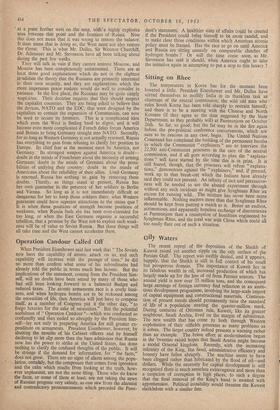Oily Waters
The recent repokt of the deposition of the Sheikh of Kuweit raised yet another ripple on the oily surface of the Persian Gulf. The report was swiftly denied, and it appeirs, happily, that the Sheikh is still in full control of his small but prosperous domain. The importance of Kuweit lies in its fabulous wealth in oil, increased production of which has largely made up for the loss of oil from Persian sources. The annual yield is now over 35 million tons, and the consequent large ,earnings of foreign currency find reflection in an ambi- tious development programme, involving-the large-scale import of capital equipment and constructional materials. Continua- tion of present trends should permanently raise the standard of life of a population nearing the quarter-million • mark. During centuries of Ottoman rule, Kuweit, like its greater neighbour, Saudi Arabia, lived on the margin of subsistence. The new wealth that has come to both through Western exploitation of their oilfields generates as many problems as it solves. The larger country indeed presents a warning rather than an example. The brave effort at modernisation begun in the 'twenties raised hopes that Saudi Arabia might become a model Oriental kingdom. Recently, with the increasing infirmity of the King, Ibn Saud, administrative efficiency and honesty have fallen abruptly. The machine seems to have been clogged rather than lubricated by the flood of oil—and dollars. While the necessity for capital development is still recognised there is much senseless extravagance and more than a suspicion of corruption in high places, to such a degree that the final removal of the King's hand is awaited with apprehension. Political instability would threaten the Kuweit sheikhdom with a similar fate.


































 Previous page
Previous page